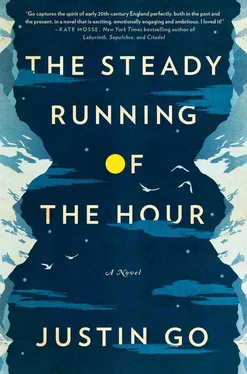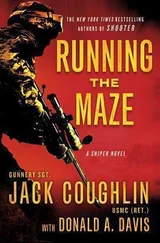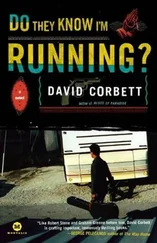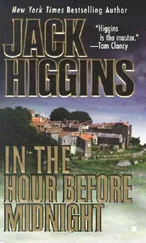— Madame, I can only reply with my own query. Have you a man serving at your table who should be serving a gun?
The old woman’s eyes narrow in contempt. She pulls the bedroom door open and Ashley drops Ismay on his bed. The woman lights an oil lamp and manages a few words of complaint, gesturing at the sheets now coated with frozen dirt. Ashley promises to have the sheets cleaned himself, but this fails to placate her and she stomps off to her bedroom cursing. Ashley tugs Ismay’s boots off and pulls the sheets over him, his greatcoat still on.
— Spymaster, Ismay mutters. Dear old spymaster—
Ashley sinks into a chair, taking a moment to consider things. The room swims with vertigoed motion. If only he could think. This is a puzzle he can solve. But what exactly is the problem? Ashley notices Ismay fanning his hand wildly, motioning for Ashley to come closer, muttering something indecipherable. Ashley goes to the bed.
— We’ll come out in the end, Ismay slurs, won’t we?
— Pardon?
— We’ll beat them. Even you must admit it.
Ashley shakes his head. — I don’t know, Ismay.
— My name is Edward.
— I don’t know, Edward.
Ismay rises from the bed. He grips Ashley’s arm forcefully.
— I shan’t go back. I’m not so stupid as to go back, do you hear? Nothing could make me go. Let them shoot me.
— Calm yourself—
— You think I’m afraid to die? You think I can’t die so well as any man?
— Quiet, Edward. Easy now.
— I shan’t go back. Do you hear?
Ismay tosses the sheets back and gasps. Ashley worries that Ismay may vomit, so he brings the basin over to the bed, holding it at his waist. Someone bangs on the floor below them, appealing for silence. Ashley curses and drops the basin on the floor.
— We’ll beat them all right, he promises.
— We’ll beat them, Ismay repeats. But first they’ll fucking ruin us—
Ismay pushes his face into the pillow, then rises feverishly toward Ashley, his eyes huge.
— You think we’ll come out of this?
— Certainly.
— You bloody liar.

Mireille and I stop at an Internet café a few miles from the house. We check our e-mail at a pair of aging computers beside a humming refrigerator stocked with soft drinks. The keyboards are sticky with grime.
There’s a new message in my in-box, but I don’t recognize the sender’s name. I scroll down to the bottom of the message: Gregory Bailey, Information Officer: Archives, Royal Geographical Society . I read the e-mail again and call to Mireille. She leans over to my monitor to look.
— What does it mean?
— They found the telegrams.
I explain that in 1924 the Mount Everest Committee kept copies of all telegrams sent through the expedition to its members. I’d requested them in London, but it had taken weeks for the archive to pull them from storage and scan them. I click through images of old telegraph forms, yellow and pink slips with cryptic messages in purple type, transcribed and carbon-copied, marked by pencils and rubber stamps. I stop at one of the messages.
2 AP 24
IMOGEN SOAMES ANDERSSON HOTTINGUER ET CIE 38 RUE DE PROVENCE PARIS
PLEASE CABLE ADDRESS HAVE WRITTEN POSTE RESTANTE BERLIN GPO RETURN ENGLAND AUGUST YOURS EVER ASHLEY
Mireille shakes her head in disbelief.
— They were in contact. But what does it mean?
— Hold on—
I run a search for “Hottinguer et Cie” and learn that Banque Hottinguer was a private bank established in Paris in 1786. Then I log on to an online encyclopedia and check the entry for poste restante .
Poste Restante (French, trans. “post which remains”) is a service where the post office holds mail until the recipient calls for it. It is a common destination for mail for people who are visiting a particular location and have no need, or no way, of having mail delivered directly to their place of residence at that time.
Mireille looks at me.
— So she wasn’t in Paris?
— I don’t think so. That’s just where her bank was. It seems like she was in Berlin—
— But how did she get the telegram if she wasn’t in Paris?
— It must have gotten forwarded by her bank. Lots of people used to do it when they traveled, I’ve seen it in archives. People could just wire your bank and you’d let the bank know which hotel you were staying at.
— I don’t understand. The message doesn’t tell you anything—
— It does. I just have to think about it.
We stare at the telegram on the screen. I think of Ashley in 1924, sending the message from a hill station in India or the remote Tibetan plateau. I think of Imogen in Berlin the same year, and I wonder why she would be there and why Ashley would be writing to her. I turn to Mireille.
— He was on an expedition. He was on the other side of the world and he wanted to send her a letter.
Mireille shakes her head. I touch her shoulder.
— Just listen. He didn’t have her address, but he knew what her bank was, and I guess he knew she was in Berlin. So he wrote her poste restante to the Berlin general post office, then sent her this telegram telling her to collect the letter.
I make a printout of the scan. Mireille goes to the cash register and pays the clerk.
— Let’s go outside, she says.

We stand outside the café, at the crossroads of this deserted hamlet where no cars drive by and most of the businesses are shuttered. Mireille draws tobacco from a paper pouch and taps it into a neat line on a leaf of rolling paper. She looks at me.
— Tu veux aller à Berlin?
— I think I have to go.
— But this telegram, Mireille insists, has nothing to do with your grandmother’s birth. Chasing it won’t get you any closer to the money. You have no idea how long she was in Berlin—
Mireille tucks the cigarette into her pocket.
— Or if she was there at all, she adds. Maybe he was guessing. Maybe she never even got the telegram.
We walk past a boulangerie , its rusted steel shutters drawn shut. A stiff wind blows along the street and Mireille zips her coat up to the neck.
— You wouldn’t even have an address to look for there.
— No.
— But you’ll go anyway.
— I know it seems crazy. But every time I’ve tried to be logical and look at records or archives, it hasn’t worked. And when I just go after something, like when I went to Leksand, or when I came up here with you, I’ve found things. It’s just like Prichard told me, there isn’t anything in normal records, so the only thing that works—
Mireille walks on past our car, shaking her head.
— Works, she repeats. You’ve learned a few things. But you haven’t found anything that will get you the money. Do you think you’re better off than before all this began? You’re nervous all the time, worrying about something you can’t control, something that already happened. You’re spending all your savings on this crazy search, and now you want to go to Berlin. Where would you even look there?
— I don’t know. The post office.
Mireille lifts her hand in the air.
— I don’t understand you. I don’t understand what you’re after. You say you don’t care about the money, but you’ll go anywhere to chase this story. Why not Amsterdam while you’re at it, why not Bruxelles or Genève? You’re just guessing, you can’t keep this up forever. How much money do you have left?
— Enough to get there.
— Et après ? What do you think you’re going to find over there? A hundred million Swiss francs? Even you aren’t that crazy. You think this is going to have an answer at the end—
Читать дальше













